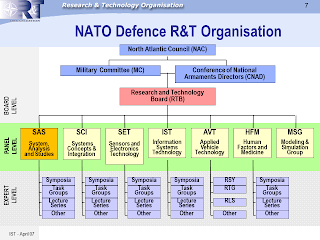The NATO Research and Technology Board, the highest authority within the NATO Research and Technology Organization, has awarded the RTO 2011 Scientific Achievement Award to the Long-Term Scientific Study on Joint Operations 2030.
My colleague Frank Bekkers and myself spent much time and effort on this study on which I have already blogged. The letter from RTB Chairman Dr. Walker states that "this Award recognizes exceptional effort in significant RTO activities, excellence and originality in the scientific and technica! content therein, as well as outstanding results in terms of military benefit.' While we are of course proud to have received this award, I want to take advantage of this occasion to share some ideas on the way in which we conduct this type of research within the Alliance.
Part of the Joint Ops 2030 team
NATO's Research and Technology Organization is the context within which scientists and specialists from across the Alliance (and partner countries) can come together to find solutions to some concrete defense problems. Every year more than 140 activities take place under the aegis of the RTO, including some 100 'task groups' - study teams that come together to conduct cooperative research and come up with new analyses, ideas or even solutions.
The activities take place in what are called 'technical panels' of which there are 6: Applied Vehicle Technology, Human Factors & Medicine, Information Systems Technology, System Analysis & Studies, Systems Concepts & Integration, Sensors & Electronics Technology.
There is also a Modelling & Simulation group that tries to maintain the Alliance's M&S activities.
The way in which this works is that a NATO member state can submit a proposal for new topics on which it would like to start a collaborative activity. If they can find at least 2 other nations willing to support this activity, they can submit it to the appropriate panel, which can then approve the activity at one of its two panel business meetings per year. The interesting part of the RTO's 'business model' is that nations are fully in charge - with very little input from Brussels. All costs of any activity are essentially fully covered by the participating nations, although there is a small Research and Technology Agency, located in Paris, that (usefully) supports them - mostly administratively. The results are also intended to not only support 'Brussels', but also (sometimes even predominantly) the national capitals themselves. When I first participated in an RTO activity, this model greatly appealed to me, as it - so I thought - guaranteed real focus and commitment from all participants.
Having participated in about 4-5 RTO activities over the past 5 years or so (all within the SAS-panel), my views on this have become more ambivalent. Especially looking ahead at the challenges that operations research will confront in the coming lean years, I strongly feel that we have to (and can!) improve the ways in which we pool our efforts in applying scientific insights to the various challenges our defense organizations are confronting. I am therefore posting the presentation I gave at last year's final business meeting panel in which Troy Harting and myself animated a discussion about possible better ways to do SAS-type work.




No comments:
Post a Comment